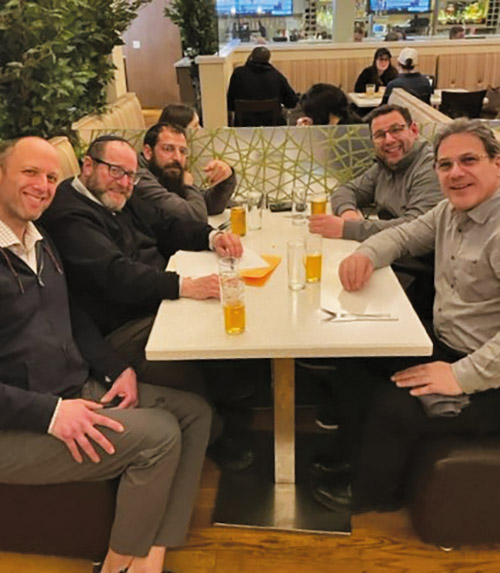




Four Questions, four courses, four cups of … beer? At least 30 Stamford-area seder tables will be enhanced with chiddushim and divrei Torah this year, thanks to the annual Men’s Seder, co-hosted by Congregation Agudath Sholom, the Young Israel of Stamford, and Bi-Cultural Hebrew Academy. This is a pre-seder, actually—where learning and seder tips are served alongside brisket eggrolls and oversized burgers.
The Men’s Seder—nearly in its bar-mitzvah year—was the brainchild of Simeon Wohlberg, a member of Agudath Sholom. Thirteen years ago, a friend in Toronto told Wohlberg about a scotch-and-Haggadah evening at his synagogue, where the rabbi gave pointers on running a successful Seder. Wohlberg shared the idea with Agudath Sholom’s Rabbi Danny Cohen, who suggested that the synagogue host a similar event at Kosh restaurant in Stamford, now Six Thirteen—featuring the Four Questions, four cups of beer, and a four-course meal. Wohlberg has participated every year, except when traveling for work.
Even COVID couldn’t put a damper on the festivities: the Men’s Seder of 2020 and 2021 were virtual events, with Six Thirteen providing takeout meals. But on April 4, a quarter of the restaurant was packed again with some 30 participants, ranging in age from mid-20s to 60s, most of them members of Agudath Sholom or the Young Israel of Stamford. The group began the evening by davening Mincha and then sat down to appetizers, beer and sandwiches.
Rabbi Cohen offered an invitation: “What is your spiritual goal for Pesach?” he asked. “By the end of the holiday, how will it have changed your life?”
As dinner progressed, several ushpizin joined the gathering, summoned by five local rabbis who delivered divrei Torah on everything from the significance of the Pesach-matzah-maror order to incorporating mussar into Seder preparations. Rabbi Tzvi Bernstein and Rabbi Josh Rosenfeld of Bi-Cultural Hebrew Academy, Rabbi Daniel Cohen and Rabbi Moshe Kurtz of Congregation Agudath Sholom, and Rabbi Eli Kohl of the Young Israel of Stamford invoked Rashi, Rambam, Ramban, Chazal, the Rama, and more contemporary scholars like Rabbi Yissocher Frand and Rabbi Shimon Schwab.
“Why do we sing Baruch HaMakom before discussing the Four Sons at the Seder?” asked Rabbi Rosenfeld. “HaMakom is the language of comfort spoken to mourners. Rabbi Schwab writes that before we sit down with our families, this is a way to recognize that we’re so lucky to be surrounded by goodness and comfort. Some may look around their table and see no children. Some may look around and see a ‘wicked son.’ Sometimes we sit down and don’t remember the weak and the poor. By reciting Baruch HaMakom, we acknowledge that it’s a privilege to be at a Seder or to witness children singing the Four Questions. We acknowledge that Hashem is everywhere, providing comfort to anyone who is alone or may be
suffering.”
Part learning, part how-to, the Men’s Seder sends participants home with techniques to engage guests at their own Seder tables. Wohlberg remembered one tip from a past event that has helped to enliven his family’s Seder: assigning homework. “We ask everybody who’s coming to research a part of the Haggadah and then present at that point during the Seder, so that even those who don’t have the ability to give a dvar Torah-type response will be knowledgeable at least in one area of the Seder and feel that they have contributed,” he said. “We have always had people of diverse backgrounds at our seder, and they have all appreciated the fact that they became the ‘expert’ of that specific part of the Seder. They are also more appreciative of some of the information once they have done their own research.”
Rabbi Cohen opened the floor to any participant who wanted to share a tip from his own Seder experience. Jesse Salver shared an insight on the significance of hardship in the Pesach story. “The pain of slavery led to our freedom,” he said. “Pain is how we grow. Once you realize that challenges are tools to living a successful life, you can see them as the path to freedom.”
Before ending the evening with Birkat Hamazon and Maariv, Wohlberg reflected on the spirit of unity underlying the event. “This is a holiday where you can go anywhere in the world and be any kind of Jew and everyone is doing the same thing, telling the same story,” he said. “Each of us should walk away saying, ‘We learned something—from the same book.’”
Twenty-something friends Adam Furmansky, Jason Lewis and Sol Redlich—all past participants—sat in a booth with first-timer Ari Goldstein. “I really enjoyed listening to the different insights from the community rabbis about Pesach, and can’t wait to tell it over again to my family,” Goldstein said. “I also loved being at a community event where people from different shuls came together to partake in the Men’s Seder. I will definitely come back next year, as I am now better prepared for my own Seder.”
By Cynthia Mindell










